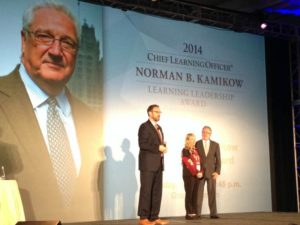
Unable to make it to California? See what you missed on the second day of our fall symposium.
by Kate Everson
October 7, 2014
Here at the CLO 2014 Fall Symposium, the second day’s events seemed to be all about playing mind games — or at least getting people to think differently.
The day started with sports. David Epstein, author of “The Sports Gene,” presented the first keynote of the day, discussing the importance of natural learning ability. Many of us think that talent is a person’s capabilities prior to training, but Epstein’s research on the physiology, neurology and psychology of athletes shows that the true talent is in how well they can pick up on skills.
Even further research shows that athletes who have sampled a number of sports can accelerate at one that they begin training for relatively late in life — for example, Roger Federer was schooled in badminton and football before starting to learn tennis as a teenager. Note that Federer is about to be no. 2 in the world at tennis.
Speaking of being second-best, did you know that Usaine Bolt, the fastest man in the world, is only 0.5 percent faster than the runner-up (no pun intended), who is anonymous in his home country? Oh, and no. 4 has a roofing company because running is only a part-time gig. The things you learn at CLO Symposium, right?
But back to what learning leaders can take from Epstein’s work on sports training. The author said the same trends seen in athletics translate to music, chess and other fields. As much as learning leaders tend to focus on niche learning, sometimes it’s more helpful to give employees the chance to explore other areas in order to boost their ability to specialize in a single role. Pushing young kids to focus on a single sport when they’re young makes them less likely to go pro — pushing employees into only one role limits their potential as they work up the chain. Moral of the story: Let employees play with their own heads by letting them sample job skills and responsibilities before settling into the best fit.
The mind-bending continued with Johnsonville Sausage’s director of organizational development and learning, Cory Bouck. During his spotlight workshop on “immersive strategic wargaming,” he described the process that put some of the food producer’s top leaders figuratively in the minds — and literally in the shirts — of their competitors. Bouck’s military history paired with design thinking to develop a simulation-style program that got leadership thinking from the perspective of the “enemy” and respond with the right business strategies.
As Bouck had learned in the military, switching up thinking by looking from a different perspective leads to open minds. By the time they literally burned the competitor’s shirts they had been forced to wear throughout the exercise, participants where mentally exhausted, which meant they were less likely to filter their ideas. Who says being fresh is the best way to do business?
But sometimes nature and fate is what plays the mind games with us, and that was certainly the case for our second keynote speaker of the day, Adam Braun. The founder of Pencils of Promise, an initiative that focuses on education in the developing parts in Guatemala, Ghana and Laos, took a Semester at Sea cruise that faced a certain-death situation when it got caught between three storms in the middle of the Pacific Ocean. “It wasn’t a near-death situation — it was a certain-death situation,” he said. During the moments of being told to get to his muster station, the place people go when they have to evacuate, he was forced to start questioning why he was there. Was it really to become a Wall Street broker, as he had thought from the time he was a kid?
Obviously Braun survived, but he continued to question his choices as he met children, such as one boy in India who said the one thing that would make him the happiest was a pencil. Since then, his new goal has been to increase access to education in the developing world.
question his choices as he met children, such as one boy in India who said the one thing that would make him the happiest was a pencil. Since then, his new goal has been to increase access to education in the developing world.
Just as situations played with Braun’s head, Pencils for Promise tries to change minds. Braun said the organization has a motto that “We are not non-profit” because it is very much in favor of profit — lifting people out of a place of economic destitution into a place where they can make money and a life for themselves. Instead, the organization says it’s a “for-purpose organization.” Three years since sharing that term, it’s resonated most with the for-profit community, where executives are excited about driving accountability and transparency. Learning leaders need to establish a sense of purpose in their employees, which in turn improves engagement and betters the world.
By the end of the day, symposium attendees had been invited to mess with employees’ heads to find their greatest potential, engage them and improve their leadership skills. The first recipient of the Norman B. Kamikow Learning Leadership Award, McDonald’s Corp.’s Diana Thomas, communicated during her acceptance speech that the Chief Learning Officer founder did that very thing by starting the magazine and events that continue to provide learning leaders with a network where they can mess with their own minds. Through her work as the fast food giant’s vice president of U.S. training, she changed the way employees saw their potential — something that learning leaders continue to do and talk about here at Fall Symposium and every day in their jobs.



